hate crime

Last night nine Christians were massacred while at Bible study at Emanuel AME Church in Charleston, S.C. The dead include state Sen. Rev. Clementa Pinckney, senior pastor and state senator, and his sister.
The suspect, Dylann Roof, is 21 years old. He sat for an hour with the pastor and others gathered for Wednesday night Bible study, then open fired. Reportedly, he reloaded as many as five times while church members tried to talk him down. He said he "had to do it." This was a racialized hate crime.

California Attorney General Kamala Harris asked a state court March 25 for an order allowing her to avoid processing a citizen-proposed anti-gay ballot measure that calls for executing gays with “bullets to the head.”
Harris said the so-called “Sodomite Suppression Act” proposed and named by Huntington Beach attorney Matthew McLaughlin “not only threatens public safety, it is patently unconstitutional, utterly reprehensible and has no place in a civil society.”
She filed an action asking the court for declaratory relief and judicial authorization allowing her to avoid issuing a title and summary for the proposal. An official state title and summary are necessary steps in authorizing a ballot initiative’s sponsors to seek the signatures needed to be placed before voters.
Without the court order, Harris said she would be compelled by law to proceed with the measure, which would authorize the killing of gays and lesbians in the state.
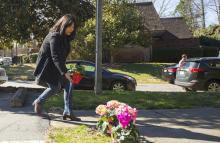
Preliminary police reports describe a long-simmering dispute over parking as the motive for the killings of three Muslim students at a Chapel Hill condominium Feb. 10.
But many Muslims in the Raleigh-Durham community and beyond are not so sure. The triple murders in this usually harmonious university town immediately took on a larger narrative of hate crimes against Muslims and charges of atheists baiting Muslims.
On Wednesday, police charged Craig Stephen Hicks, 46, of Chapel Hill with three counts of first-degree murder.
They allege he shot Deah Shaddy Barakat, 23, and his wife, Yusor Mohammad Abu-Salha, 21, and Abu-Salha’s sister, Razan Mohammad Abu-Salha, 19, of Raleigh inside their condominium near the University of North Carolina campus in Chapel Hill.
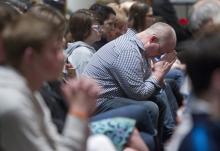
The violence of hatred breaks our hearts. This past weekend in my neighborhood of Overland Park, a shooter killed three people and injured others. My church sits a mile from the sites, and members of my parish know the families of the victims. We are in the process of responding, holding vigils and praying, seeking to comfort one another and make sense of this hateful thing.
I know two ways souls respond to such hate. In one, the heart hardens against the violence, protecting itself. In the other, the heart weeps, leaving itself open to be broken again.
The first way can seem so right. There is a dark logic in giving our hearts permission to loathe the one who could go to so terrible a place, and arm himself to take lives randomly with gunfire. There is a sort of helpless security in burying our hearts away from the reports of such violence. If this gives up some piece of our humanity, at least it keeps our hearts from feeling such pain again.
Yet I have to believe in the other way, leaving my heart open to the world, though it will be broken again and again. In part, this is because I know that claiming permission to hate one man makes way for hating others, and then hating them by groups and by labels, until perhaps one day I wouldn’t care if they lived or died.

In the aftermath of violence, a deep-seated illness of broken minds and spirits, a possibility toward healing always exists. The vicious anti-Semitic attack on a northern New Jersey synagogue exemplifies this possibility. Violence – religious intolerance – was not to have the last word, nor was forgiveness to be blindly shared. A searching for truth was to be engaged. This searching began in the blurring of demarcation lines between different faiths.

A man who assaulted two men because he thought they were Muslims and was then ordered to write a report on the cultural contributions of Islam has a new assignment — to write a report on the history of Hinduism.
Bay County Circuit Judge Joseph K. Sheeran on Monday sentenced Delane D. Bell, 26, to two years of probation, with the condition that he pen a 10-page report on Hinduism, the world’s third largest religion.
Last March, Bell pleaded no contest to a two-year felony count of ethnic intimidation, stemming from an incident that occurred on Nov. 26, 2011. At that time, Bell was standing outside a bar when he yelled “jihad” and “Osama bin Laden” at two men of Indian descent. He then punched one of the men and struck the other’s car.
When Bell entered his plea, Sheeran ordered him to write a 10-page report on “the greatest accomplishments of Muslims.”
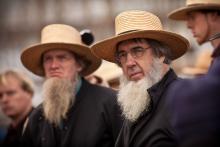
CLEVELAND — No one disputes that followers of Amish bishop Samuel Mullet Sr. used horse-mane shears last year to forcibly cut the beards and hair of other members of Amish communities in rural Ohio.
Only their motivation is in dispute as Mullet and 15 of his faithful stand trial in U.S. District Court on federal hate-crime charges. Did religious bias move them to act, or did a compassionate desire to help wayward brethren return to strict Amish ways?
"Why did they do this? I know it sounds strange: Compassion," defense attorney Dean Carro told jurors Tuesday during opening statements. "No crime has been committed. These were purely good intentions."
But prosecutors showed jurors a photo of defendant Johnny Mullet using one hand to grab the long, white beard of Raymond Hershberger, a 79-year-old Amish bishop, and using the other hand to chop.

The law of God will collide with the law of man this week in a crowded federal courtroom in Cleveland, where 16 Amish defendants — 10 men with full beards, six women in white bonnets — will stand trial on charges related to a series of beard- and hair-cutting attacks against fellow Amish men and women last year.
The case has attracted national and international attention, in part because of public curiosity about the normally reclusive and peaceful Amish community, and because of the peculiar nature of the alleged crimes.
Interest also has been heightened by the fact that the federal government rather than a local prosecutor brought the charges. The case is the first in Ohio to make use of a landmark 2009 federal law that expanded government powers to prosecute hate crimes.
Amid a rash of recent attacks that are being investigated as hate crimes, a coalition of more than 150 organizations is calling on the Senate Judiciary Committee to conduct hearings next month with the aim of revamping hate crime legislation.
Led by the Sikh Coalition, the group of civil rights and religious organizations issued a letter on August 21 urging committee chairman Sen. Patrick Leahy, D-Vt., and ranking member Sen. Chuck Grassley, R-Iowa, to look into hate crimes and hate groups in the United States.
The letter noted that the shooter that killed six at a Wisconsin Sikh temple, or gurudwara, in August had ties to hate groups. It also cited 10 Islamic institutions in seven states that have been vandalized, shot at, or burned in the past month.
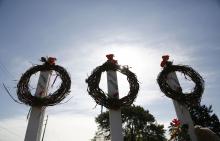
Few can know what goes through the twisted mind of a mass killer, but Wade Michael Page left behind plenty of signs that he was consumed by one thing: hate.
Page, 40, was identified by police Monday as the gunman who killed six worshippers Sunday morning at a Sikh temple here. Local and federal authorities said they were investigating whether the shooting was an act of domestic terrorism.
The bald, heavy man decorated in tattoos and shot dead in an exchange with police played in hate bands and used hate-filled heavy-metal music to recruit white supremacists to the cause.

Law enforcement authorities don't know why suspected gunman Wade Michael Page burst into a Sikh temple in Oak Creek, Wis., on Sunday and opened fire, killing six before he was shot dead by the police.
But many American Sikhs say they do know this: Their community has been targeted by a growing number of hate crimes since the 9/11 terrorist attacks. The New York-based Sikh Coalition reports more than 700 such incidents since 2001. The question is: Why?
"The turban is the main issue here," said Pashaura Singh, a professor of Sikh and Punjabi studies at the University of California-Riverside. "People confuse Sikhs with Osama bin Laden."
Following 9/11, bin Laden and his al-Qaida associates were often shown in media reports wearing white turbans. Combine that with a lack of basic knowledge about the estimated 500,000 Sikhs living in the U.S. and you get tragic — and sometimes violent — cases of mistaken identity.
A Joplin, Mo., mosque has again been the target of a "suspicious" fire, according to the Joplin Globe. The Islamic Society of Joplin reported on Monday the second fire  this summer — this one engulfing the entire building.
this summer — this one engulfing the entire building.
The mosque's Imam said the blaze will not keep worshippers from their prayers. From the reports:
“This should not stop us from serving God,” said Imam Lahmuddin, the mosque’s religious leader. “We still have to fulfill our obligation. We will do our prayer in other places. If we don’t find a place, we will do our prayers in our home. We cannot miss any of the five prayers.”
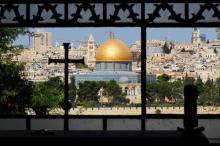
Independence Day in Joplin, Mo. saw fireworks of a different kind. On July 4, the Islamic Society of Joplin’s mosque was set on fire. While the mosque has only been open since 2007, it has already been targeted twice by arsonists. These hateful attacks must stop.
The biblical call to love our neighbors as ourselves requires Christians to speak out against these attacks. By protecting the rights of American Muslims to worship in the United States, we provide a powerful witness to those countries where Christian minorities face attack and persecution, such as Nigeria, Egypt, Somalia, and Kenya. If we expect others to take our advocacy for global religious freedom seriously, then our efforts must begin in our own backyard.
While the FBI is investigating the incident, the fact that a religious community was targeted means the attack should be investigated as a potential hate crime. Christians around the country are speaking out to ensure the Department of Justice gives this the necessary attention it deserves. Add your voice to the petition calling for a hate crimes investigation and show a little love to your Muslim neighbors in Joplin, Mo.
From the Associated Press via STLToday.com:
JOPLIN, Mo. — The FBI has joined an investigation into the second fire at a Joplin mosque in four years.
The blaze early Wednesday burned a 4-by-6-foot section of shingles atop the Islamic Society of Joplin's building. Firefighters extinguished the flames before they could do further damage, authorities told The Joplin Globe.
Capt. Kelly Stephens of the Jasper County Sheriff's Department said investigators were studying security camera footage but he would not say what the tapes showed.
About 50 families are members of the Islamic Society of Joplin, which opened the building in 2007 as a mosque and community center, society officials said. The FBI led an investigation in 2008 when the mosque's sign was torched; that crime remains unsolved.
On Saturday, doctors took Shaima Alawadi, 32, an Iraqi mother of five, off life support, three days after her 17-year-old daughter, Fatima Al Himidi, found her brutally beaten and unconscious in the dining room of the family’s home in El Cajon, Calif. She died a short while later at 3 p.m.
Fatima told reporters that her mother’s head had been repeatedly smashed in with a tire iron — a metal rod used to pry the rubber tube from a bike tire. Next to Alawadi’s barely breathing body was a note: “Go back to your country, you terrorist."

A pair of scissors transported across state lines has emerged as a controversial element in Ohio's first case under a landmark 2009 federal law that expanded government powers to prosecute hate crimes.
The case involves a dozen members of an Amish sect in central Ohio who are charged with using the shears -- made in New York and brought to Ohio -- to forcibly cut the hair and beards of fellow Amish to avenge a religious dispute.
The travel history of the shears may seem like a peculiar point in the peculiar case that has focused national attention on Ohio's Amish community. But the hate crimes law -- like many other federal statutes, including health-care reform legislation -- is rooted in Congress' far-reaching power to regulate interstate commerce.
Enacted in 2009, the Matthew Shepard and James Byrd Jr. Hate Crimes Prevention Act was named for a gay University of Wyoming student who was beaten and tortured to death by two men in 1998, and a black man who was chained to a pickup truck and dragged to death in Texas that same year.
On May 30, 2009, a terrorist attack in Arizona ended the lives of two U.S. citizens -- a Latino man and his 9-year-old daughter.
I recently viewed an episode of Gangland on The History Channel. This particular show, which documents the rise of the younger members of the Imperial Klan of America (or KKK), really roused my anger. I thought, "How could people be so ignorant and foolish?" Can't they just accept that the United States has always been an ethnically, religiously, and ideologically diverse country?